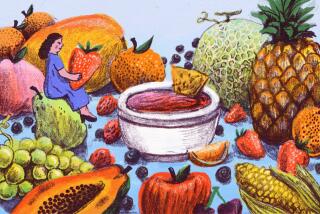IN SEASON / Guavas : Tropical Treat Tastes as Good as It Looks
- Share via
Amateur gardeners are sometimes unaware of the edible nature of the fruit of the guava bushes often planted as hedges in local yards.
Used mainly as ornamentals, guavas put forth a profusion of fragrant pink blossoms in the spring. The small, oval fruit that appears in the fall is, in many cases, left to fall off and rot. This is the season for anyone who hasn’t yet tasted a freshly picked pineapple guava, or feijoa (Feijoa sellowiania), as it is commonly called in California, to be in for a delicious surprise.
Distinct flavor and tiny edible black seeds differentiate the feijoa from its larger-seeded relative in the psidium family, the tropical guava (Psidium guajava) and the red and yellow strawberry (Psidium cattleianum).
Paul Thompson, co-founder of California Rare Fruit Growers, has been growing guavas for more than 25 years. Yield and sweetness depend on the growing area, as well as on the local temperature, he says. Thompson has found that the Trask and the Nazemetz feijoas are ideally suited to his hillside property in Bonsall.
Thompson favors the self-pollinating Nazemetz. “It has a very good flavor,” he said. “The pulp of most feijoas turns brown after they’re cut open and the flesh oxidizes quickly, but not the Nazemetz.”
The Trask feijoa, on the other hand, needs a pollenizer to bear fruit. Thompson has planted alternating rows of Trask and Nazemetz to foster pollination.
Howard and Iran Jewett of Vista are longtime feijoa and guava aficionados and growers.
“Philosophically, it’s a very good plant,” Iran Jewett said. “Barely 2 1/2 years after planting a seed, you can get fruit.”
Each fruit variety offers a different flavor. “If you’re a fancier, you have your favorites,” Jewett says. “In Asia, people prefer to eat the fruit just as it begins to ripen. Many Asian guavas reach a peak just as they begin to turn color.”
South American varieties of the Psidium cattleianum, on the other hand, attain their best flavor when completely ripe. One of the prettiest, according to the Jewetts, is the Brazilian guava, which grows to the size of a large, light green pear, with a firm, pink flesh.
In many parts of the world, feijoas are prized for their medicinal properties. The tiny seeds found inside certain varieties are believed to be good for digestion.
“Sometimes the seed portion is the most delicious part,” Jewett said.
Still another tropical guava is favored by Maria Erlandson, whose husband, Carl, is president of the North County chapter of California Rare Fruit Growers.
Erlandson lists her favorite variety as the Benjamin.
“People can hardly wait until I unload them from my truck at the market,” she said. She described the fruit as a large, very sweet guava “that stays crunchy on the tree.” This particular variety is usually available around Thanksgiving.
Among the nurseries that carry guava bushes is Exotica Nursery in Vista. Co-owner Jessica Leaf describes the guava as an excellent accent for any yard.
“Tropical guavas do well here, and make beautiful evergreen trees,” she said. “They also produce fruit at times when there aren’t too many on the market.”
Some, like the Mexican cream, are ideal for juice, Leaf said. Others, such as guavas popular in India and the Philippines, are best when eaten out of hand.
“U.S. consumers have a tendency to let them get too ripe,” she said. According to this grower, the pear guava “is one of the best, and one of the rarest as well.”
Exotica Nursery also carries the giant Bangkok guava and the Krom Toon Khao from Thailand, which produces fruit weighing in at 1 to 2 pounds apiece.
California Rare Fruit Growers recommends planting guava bushes in cooler locations (not on the hot side of a house) for best results.
Guavas are high in Vitamin A and one of the highest sources of Vitamin C. They are also high in fiber. They can be used to make jellies and jam, and the peeled, ripe, fruit is delicious in fruit salads. Guavas can also be pressed for juice.
Carl and Maria Erlandson, 741-8874. Sell mainly at Vista Farmer’s Market. Price depends on availability and size.
Howard and Iran Jewett, 3062 Sumac Road, Fallbrook, 92028. 723-0845. Will pick on request with a day’s notice. Baskets between 50 cents and $1 each at Vista Farmer’s Market.
Exotica Rare Fruit Nursery, 2508-B East Vista Way, Vista, 92084. 724-9093. Inventory sale through October. Five-gallon guava plants are $15 to $18; 15-gallon containers are $50 to $60. All varieties on hand.






